|
CRAFTSMEN PUT BEST FOOT FORWARD
To those reared on the flood tide of cheap shoe imports, on the misbegotten trainer, unlovely clogs and plastic flip flops, paying upwards of £800 for a shoe might seem outrageous.
But considering the ingredients, skill, hours and love that go into making a bespoke pair of shoes, it is obvious that 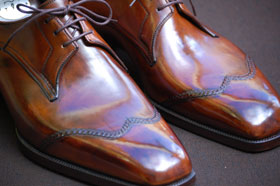 they are in fact a bargain for any man who aspires to elegant style. they are in fact a bargain for any man who aspires to elegant style.
A pair of hand crafted shoes, like a Savile Row suit, offers value for money not only in the fit and comfort they afford but in their long life and intrinsic craftsmanship.
And though the British shoe industry may have been decimated by the influx of throw-away Chinese fashions, there are still those carrying the banner for a long tradition of British shoemakers, and indeed fresh ones joining their ranks.
One such is the company of Gaziano & Girling. This may have an Italian ring to it but it is in fact the partnership of two young and dedicated British shoemakers who have their bespoke workshop in Northamptonshire, long the heartland of quality shoemaking, and a presence in Savile Row at Chittleborough & Morgan.
Tony Graziano and Dean Girling had  nurtured their passion for nurtured their passion for  shoemaking at various top name shoe houses, including Edward Green and Lobb, and decided to launch their own business four years ago. Already recognised as craftsmen with a stylish twist, they have rapidly built up a loyal following in this country and abroad for their bespoke as well as ready-to-wear collections. shoemaking at various top name shoe houses, including Edward Green and Lobb, and decided to launch their own business four years ago. Already recognised as craftsmen with a stylish twist, they have rapidly built up a loyal following in this country and abroad for their bespoke as well as ready-to-wear collections.
Tony Gaziano, left, and Dean Girling, right, and above and below their elegant shoes.
"Our bespoke shoes are really at the pinnacle of our output, very high grade," said Tony Graziano. "And then we supply around 30 to 40 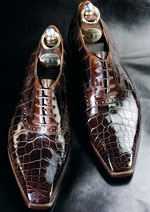 top stores around the world with our ready made shoes." top stores around the world with our ready made shoes."
New for next year will be their Deco line, completely handmade, based upon an Art Deco style - "refined, elegant, slim" - and made from their own lasts.
"Basically, these are for the man who doesn't want to wait the 6 to 8 months and the various fittings required for the fully bespoke," he explained.
Tips for keeping beautiful shoes in shape include polishing regularly with the correct shade of polish, allowing them to dry naturally when wet, never near a heater, using shoe trees, alternating pairs so that they recover after wear, and using a shoe horn to put them on. And occasionally it is worth removing layers of old polish with a water based spirit cleaner, then applying a shoe cream for moisture and nourishment, before starting to build up layers of wax polish to create a deep shine.
 A craftsman who has worked his way up from shoe retailing to top of the shoemaking tree is Clifford Roberts. He been learning his craft over 30 years in the business, including time at Crocket & Jones and Edward Green, and now works alone from home in Northampton, making the finest English shoes and boots. A craftsman who has worked his way up from shoe retailing to top of the shoemaking tree is Clifford Roberts. He been learning his craft over 30 years in the business, including time at Crocket & Jones and Edward Green, and now works alone from home in Northampton, making the finest English shoes and boots.
"I developed a real passion for shoe making and decided to start making my own. I am basically self taught,” he explains, “and spent many, many cold nights sitting learning by trial and error to perfect the art of making a shoe. I am always learning as I go along.”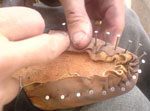
Like many a lone craftsman, he has no website as yet, but by word of mouth and personal recommendations he has attracted customers from around the world.
His shoes are handmade “and I don't mean hand work in the sense of holding the shoes to a machine which can be called handmade as it is held in the hand, I mean hand as in totally lasted by 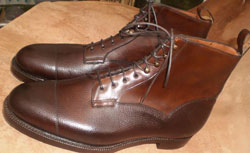 hand and welt sewn by hand, no machine involved” he emphasises. hand and welt sewn by hand, no machine involved” he emphasises.
Up until now, he has made the shoes from a range of lasts that he has, or from those supplied by the customer. "Being a working man myself I could never afford to buy top end shoes and decided I wanted to be 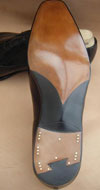 able to offer the working man a good quality handmade shoe for a good price." able to offer the working man a good quality handmade shoe for a good price."
From the beginning of next year, he will also be offering a fully bespoke service, meaning he will also have lasts made for the individual customer, but still at a very good price.
"I'll measure their feet, discuss their requirements, make trial leather shoes and when the fit is perfect, make the last. Then the finest leather is selected and their shoes or boots made."
Above, Cliff Roberts and a pair of his boots, and the finish of his shoes, right.
Doyen of the bespoke shoe craft is Fosters, which incorporates another great shoe name Henry Maxwell.
Based in Jermyn Street, long the exclusive centre for men's accessories, this 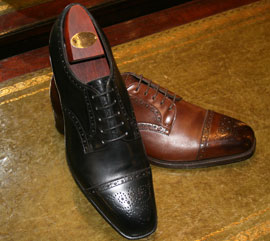 famous name has been creating shoes for stylish men since 1840 (Maxwell 1750), making it one of the oldest handmade bespoke shoemakers in the world. famous name has been creating shoes for stylish men since 1840 (Maxwell 1750), making it one of the oldest handmade bespoke shoemakers in the world.
Fosters semi-brogue Oxford, left, and their Hurlingham boot below. At bottom master shoemaker Terry Moore.
Still privately owned, its head last maker, Terry Moore, can boast unrivalled experience, having just celebrated 60 years in shoemaking. He has been responsible for training a succession of dedicated makers, including his two current assistants, Emiko Matsuda, senior shoemaker, and pattern cutter Emma Lakin.
They share his love of the craft and ensure Fosters will continue to make the elegant styles to the standards he has established over 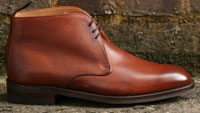 the years. the years.
"It is fantastic that in this disposable age, craftsmanship is alive and kicking!" said Frankie Delamain of Fosters.
"All sorts of people comes to us, from billionaire financiers to some who have a monthly saving plan to ensure that they are able to afford the very best shoes that money can buy. And they come from all over the world, especially the US and 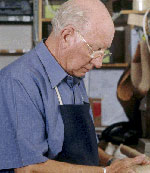 Japan. We have a Japanese shoemaker in Jermyn Street who looks after our Japanese customers and travels there twice a year." Japan. We have a Japanese shoemaker in Jermyn Street who looks after our Japanese customers and travels there twice a year."
First step in Fosters process is a tracing of the feet on which the shoes will be worn, followed by full measurements being taken and then a discussion about style. The last forms the basis of the shoe, carved from a single piece of strong wood to the measurements required. When the uppers and the inner soles have been hand stitched, the fitting will take place, usually 4 to 5 months after the first measurements were taken, and then the sole attached.The whole process through to delivery takes around 8 months.
|